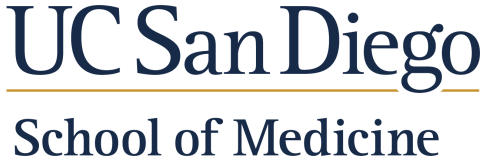

CME Certificates will be issued digitally after Speaker Evaluations and Overall Surveys are completed. Surveys are accessible from this website after logging in with the email address you submitted during registration. Surveys will be available online starting the first day of the symposium. You must complete the process by April 7, 2025 in order to receive your certificate. Certificates will be available online until September 1, 2025 and are printable directly from the website.
Login required for access to Conference Materials (use registration email address).
![]()

The University of California San Diego School of Medicine is accredited by the Accreditation Council for Continuing Medical Education to provide continuing medical education for physicians
The University of California San Diego School of Medicine designates this live activity for a maximum of 8.25 AMA PRA Category 1 Credits™. Physicians should claim only the credit commensurate with the extent of their participation in the activity.
This course is designed to provide the learner with the most up-to-date evidence for ICD and CRT based therapy. It provides a State of the Art review of ICD and CRT management, as well as, an in-depth review of implantation techniques, programming complications and follow-up aspects.
The program directors want to provide a comprehensive course for electrophysiologist, cardiologist and fellows-in-training focusing specifically on ICD based therapy, which is otherwise not provide in a comprehensive format.
Upon the completion of this activity, participants should be able to:
Electrophysiologists, Cardiologists, EP Fellows and Cardiology Fellows interested in EP, PAs, NPs, Nurses, Technicians and other allied health professionals.
The program directors want to provide a comprehensive course to electrophysiologists, cardiologists and fellows in training focusing specifically on ICD based-therapy, which is otherwise not provided in a comprehensive format.
It is our policy to ensure that the content of accredited continuing education and related materials is accurate, balanced, objective, and scientifically justified. Education must be free of the influence or control of ineligible companies, and protect learners from promotion, marketing, and commercial bias. All persons in a position to control the content of accredited continuing education must disclose all financial relationships held with ineligible companies, prior to assuming a role in the activity. Those relationships deemed relevant to the education are mitigated prior to the activity through one of the following strategies, depending on the nature of relationship and the role of the person: 1) divesting the financial relationship, 2) altering the individual’s control over content, and/or 3) validating the planning decisions and/or content through independent peer review. All relevant financial relationships are mitigated prior to the activity and mitigation strategies and necessary steps for implementation are communicated to individuals prior to them assuming their role in the activity. Persons who refuse or fail to disclose are disqualified from participating in the activity. Activities are evaluated by participants and peer reviewers to determine if the content was free of bias and met acceptable scientific standards. This information is considered in future activity planning. All relevant financial relationships and the nature of those relationships are noted below. All relevant financial relationships have been mitigated.
This activity is in compliance with California Assembly Bills 1195 and 241 which requires continuing medical education activities with patient care components to include curriculum in the subjects of cultural and linguistic competency. Cultural competency is defined as a set of integrated attitudes, knowledge, and skills that enables health care professionals or organizations to care effectively for patients from diverse cultures, groups, and communities. Linguistic competency is defined as the ability of a physician or surgeon to provide patients who do not speak English or who have limited ability to speak English, direct communication in the patient’s primary language. Cultural and linguistic competency was incorporated into the planning of this activity.